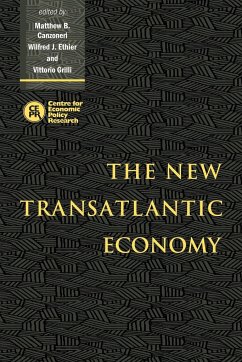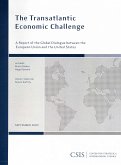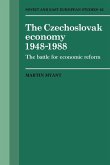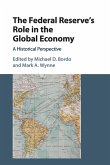- Broschiertes Buch
- Merkliste
- Auf die Merkliste
- Bewerten Bewerten
- Teilen
- Produkt teilen
- Produkterinnerung
- Produkterinnerung
An economic analysis of the causes and effects of the breaking up of the transatlantic economy, first published in 1996.
Andere Kunden interessierten sich auch für
![The Transatlantic Economic Challenge The Transatlantic Economic Challenge]() Bruce StokesThe Transatlantic Economic Challenge60,99 €
Bruce StokesThe Transatlantic Economic Challenge60,99 €![Unity with Diversity in the European Economy Unity with Diversity in the European Economy]() BlissUnity with Diversity in the European Economy33,99 €
BlissUnity with Diversity in the European Economy33,99 €![The Soviet Union and Eastern Europe in the Global Economy The Soviet Union and Eastern Europe in the Global Economy]() The Soviet Union and Eastern Europe in the Global Economy40,99 €
The Soviet Union and Eastern Europe in the Global Economy40,99 €![The Political Economy of Predation The Political Economy of Predation]() Mehrdad VahabiThe Political Economy of Predation47,99 €
Mehrdad VahabiThe Political Economy of Predation47,99 €![The Czechoslovak Economy 1948 1988 The Czechoslovak Economy 1948 1988]() Martin MyantThe Czechoslovak Economy 1948 198845,99 €
Martin MyantThe Czechoslovak Economy 1948 198845,99 €![The Federal Reserve's Role in the Global Economy The Federal Reserve's Role in the Global Economy]() The Federal Reserve's Role in the Global Economy49,99 €
The Federal Reserve's Role in the Global Economy49,99 €![Transatlantic Policymaking in an Age of Austerity: Diversity and Drift Transatlantic Policymaking in an Age of Austerity: Diversity and Drift]() Flor AartsTransatlantic Policymaking in an Age of Austerity: Diversity and Drift35,99 €
Flor AartsTransatlantic Policymaking in an Age of Austerity: Diversity and Drift35,99 €-
-
-
An economic analysis of the causes and effects of the breaking up of the transatlantic economy, first published in 1996.
Hinweis: Dieser Artikel kann nur an eine deutsche Lieferadresse ausgeliefert werden.
Hinweis: Dieser Artikel kann nur an eine deutsche Lieferadresse ausgeliefert werden.
Produktdetails
- Produktdetails
- Verlag: Cambridge University Press
- Seitenzahl: 352
- Erscheinungstermin: 30. Juni 2010
- Englisch
- Abmessung: 229mm x 152mm x 21mm
- Gewicht: 572g
- ISBN-13: 9780521142625
- ISBN-10: 0521142628
- Artikelnr.: 31187734
- Herstellerkennzeichnung
- Libri GmbH
- Europaallee 1
- 36244 Bad Hersfeld
- gpsr@libri.de
- Verlag: Cambridge University Press
- Seitenzahl: 352
- Erscheinungstermin: 30. Juni 2010
- Englisch
- Abmessung: 229mm x 152mm x 21mm
- Gewicht: 572g
- ISBN-13: 9780521142625
- ISBN-10: 0521142628
- Artikelnr.: 31187734
- Herstellerkennzeichnung
- Libri GmbH
- Europaallee 1
- 36244 Bad Hersfeld
- gpsr@libri.de
List of figures
List of tables
Preface
List of conference participants
1. Introduction Matthew B. Canzoneri, Wilfred J. Ethier, and Vittorio Grilli
2. Transatlantic policy coordination with sticky labour markets: the reality of the real side Andrew Hughes Hallett and Yue Ma
Discussion Nouriel Roubini
3. Foreign exchange intervention and international policy coordination: comparing the G3 and EMS experience Axel A. Weber
Discussion Joseph Gagnon
4. Trading blocs and the sustainability of interregional cooperation Eric Bond and Constantinos Syropoulos
Discussion Konstantine Gatsios
5. The effects of trade liberalization on the members of a trading bloc: a lumpy country analysis Alan V. Deardorff
Discussion L. Alan Winters
6. The increased importance of direct investment in North Atlantic economic relationships: a convergence hypothesis James R. Markusen and Anthony J. Venables
Discussion Alasdair Smith
7. Speculative attacks on pegged exchange rates: an empirical exploration with special reference to the European Monetary System Barry Eichengreen, Andrew K. Rose, and Charles Wyplosz
Discussion Robert E. Cumby, Robert P. Flood
8. Central banks and reputation: some transatlantic contrasts Ben Lockwood, Marcus Miller, and Lei Zhang
Discussion Stanley W. Black
9. Trade liberalization and trade adjustment assistance K. C. Fung and Robert W. Staiger
Discussion Constantinos Syropoulos
10. Trade liberalization as politically optimal exchange of market access Arye L. Hillman and Peter Moser
Discussion Martin Richardson
Index.
List of tables
Preface
List of conference participants
1. Introduction Matthew B. Canzoneri, Wilfred J. Ethier, and Vittorio Grilli
2. Transatlantic policy coordination with sticky labour markets: the reality of the real side Andrew Hughes Hallett and Yue Ma
Discussion Nouriel Roubini
3. Foreign exchange intervention and international policy coordination: comparing the G3 and EMS experience Axel A. Weber
Discussion Joseph Gagnon
4. Trading blocs and the sustainability of interregional cooperation Eric Bond and Constantinos Syropoulos
Discussion Konstantine Gatsios
5. The effects of trade liberalization on the members of a trading bloc: a lumpy country analysis Alan V. Deardorff
Discussion L. Alan Winters
6. The increased importance of direct investment in North Atlantic economic relationships: a convergence hypothesis James R. Markusen and Anthony J. Venables
Discussion Alasdair Smith
7. Speculative attacks on pegged exchange rates: an empirical exploration with special reference to the European Monetary System Barry Eichengreen, Andrew K. Rose, and Charles Wyplosz
Discussion Robert E. Cumby, Robert P. Flood
8. Central banks and reputation: some transatlantic contrasts Ben Lockwood, Marcus Miller, and Lei Zhang
Discussion Stanley W. Black
9. Trade liberalization and trade adjustment assistance K. C. Fung and Robert W. Staiger
Discussion Constantinos Syropoulos
10. Trade liberalization as politically optimal exchange of market access Arye L. Hillman and Peter Moser
Discussion Martin Richardson
Index.
List of figures
List of tables
Preface
List of conference participants
1. Introduction Matthew B. Canzoneri, Wilfred J. Ethier, and Vittorio Grilli
2. Transatlantic policy coordination with sticky labour markets: the reality of the real side Andrew Hughes Hallett and Yue Ma
Discussion Nouriel Roubini
3. Foreign exchange intervention and international policy coordination: comparing the G3 and EMS experience Axel A. Weber
Discussion Joseph Gagnon
4. Trading blocs and the sustainability of interregional cooperation Eric Bond and Constantinos Syropoulos
Discussion Konstantine Gatsios
5. The effects of trade liberalization on the members of a trading bloc: a lumpy country analysis Alan V. Deardorff
Discussion L. Alan Winters
6. The increased importance of direct investment in North Atlantic economic relationships: a convergence hypothesis James R. Markusen and Anthony J. Venables
Discussion Alasdair Smith
7. Speculative attacks on pegged exchange rates: an empirical exploration with special reference to the European Monetary System Barry Eichengreen, Andrew K. Rose, and Charles Wyplosz
Discussion Robert E. Cumby, Robert P. Flood
8. Central banks and reputation: some transatlantic contrasts Ben Lockwood, Marcus Miller, and Lei Zhang
Discussion Stanley W. Black
9. Trade liberalization and trade adjustment assistance K. C. Fung and Robert W. Staiger
Discussion Constantinos Syropoulos
10. Trade liberalization as politically optimal exchange of market access Arye L. Hillman and Peter Moser
Discussion Martin Richardson
Index.
List of tables
Preface
List of conference participants
1. Introduction Matthew B. Canzoneri, Wilfred J. Ethier, and Vittorio Grilli
2. Transatlantic policy coordination with sticky labour markets: the reality of the real side Andrew Hughes Hallett and Yue Ma
Discussion Nouriel Roubini
3. Foreign exchange intervention and international policy coordination: comparing the G3 and EMS experience Axel A. Weber
Discussion Joseph Gagnon
4. Trading blocs and the sustainability of interregional cooperation Eric Bond and Constantinos Syropoulos
Discussion Konstantine Gatsios
5. The effects of trade liberalization on the members of a trading bloc: a lumpy country analysis Alan V. Deardorff
Discussion L. Alan Winters
6. The increased importance of direct investment in North Atlantic economic relationships: a convergence hypothesis James R. Markusen and Anthony J. Venables
Discussion Alasdair Smith
7. Speculative attacks on pegged exchange rates: an empirical exploration with special reference to the European Monetary System Barry Eichengreen, Andrew K. Rose, and Charles Wyplosz
Discussion Robert E. Cumby, Robert P. Flood
8. Central banks and reputation: some transatlantic contrasts Ben Lockwood, Marcus Miller, and Lei Zhang
Discussion Stanley W. Black
9. Trade liberalization and trade adjustment assistance K. C. Fung and Robert W. Staiger
Discussion Constantinos Syropoulos
10. Trade liberalization as politically optimal exchange of market access Arye L. Hillman and Peter Moser
Discussion Martin Richardson
Index.








